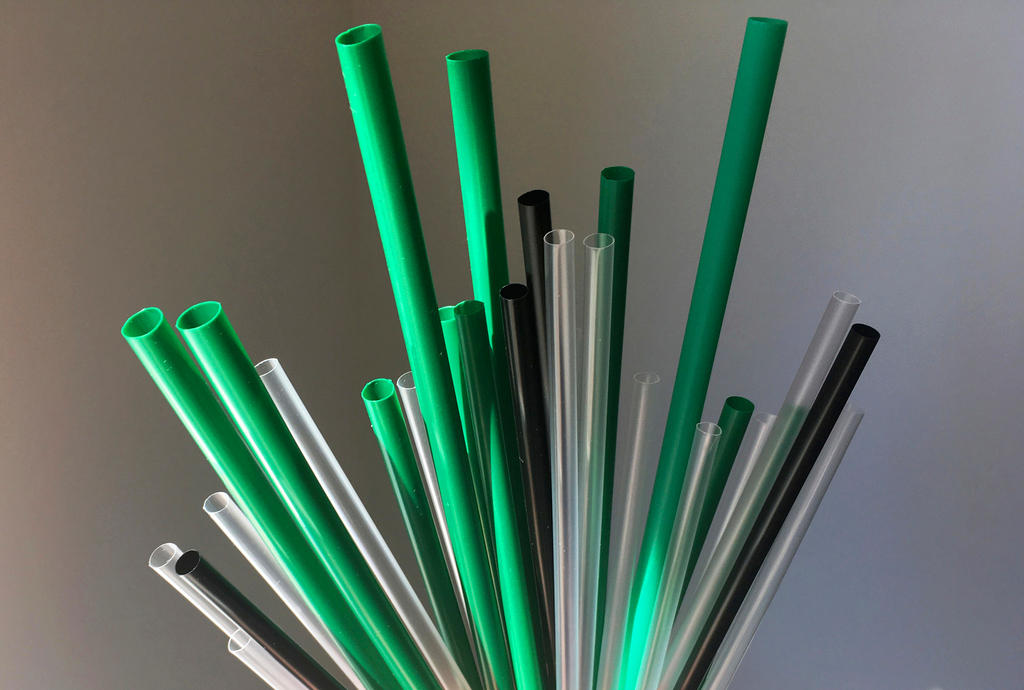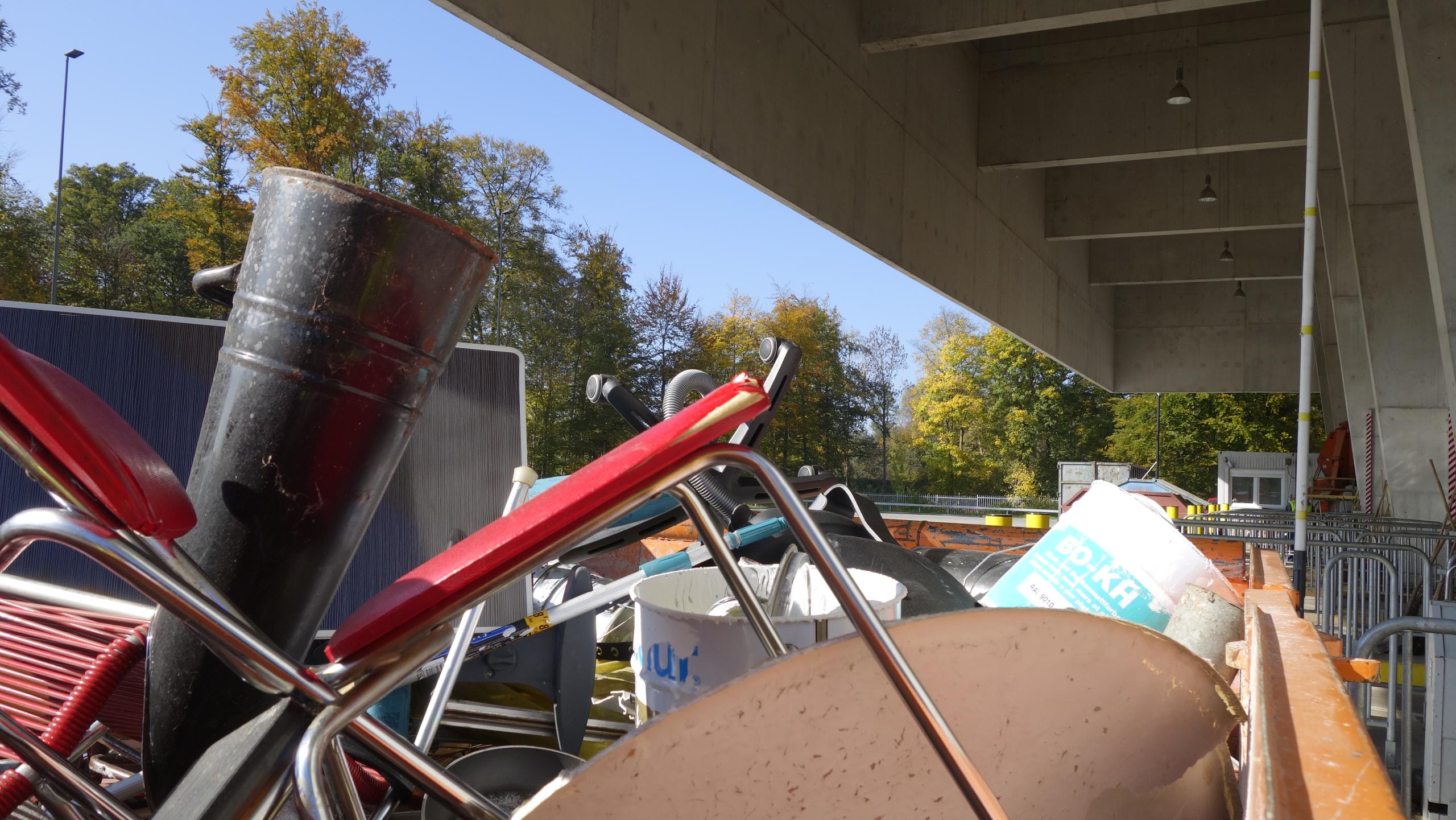Nations meet in Geneva to regulate plastic waste trade

Officials from over 180 states have gathered in Geneva to discuss how to better manage the global trade in recyclable plastic. Marco Buletti, a Swiss government environment specialist, is confident that a solution is within reach.
State parties to the Basel ConventionExternal link, the main global treaty regulating the trans-national movement of hazardous waste, are in the Swiss city from April 29 to May 10 to try to agree on how to better control the worldwide trade in plastic waste.
If a proposal tabled by Norway is adopted next week, plastic waste exporters would be required to obtain prior approval from the importing nation and to provide more detailed information on the volume and type of waste in question.
The fourteenth meeting of the Conference of the Parties to the Basel Convention is taking place in Geneva in parallel to the ninth Conference of the Parties to the Rotterdam Convention and the ninth meeting of the Conference of the Parties to the Stockholm Convention. Key decisions are also expected on electronic waste and hazardous chemicals.
Marco Buletti is deputy head of the Waste Management and Resources Division at the Federal Office for the Environment.
swissinfo.ch: Why is an international solution needed to regulate the trade in plastic waste?
Marco Buletti: In recent years, huge amounts of plastic waste have been moved across borders, but you never knew what kind of plastic waste it was. Was it plastic that could be recycled? Will it actually be recycled or was it just municipal waste simply being exported and dumped?
Because China closed its borders [in 2018], plastic waste streams are searching for new paths and other vulnerable countries are being flooded by plastic waste allegedly for recycling. But we don’t know if they have the infrastructure, and we also can’t be sure that this plastic waste is being properly controlled.
swissinfo.ch: Do you expect a definite decision on the Norway proposal in the next two weeks?
M.B.: I have the feeling that states are starting to acknowledge that plastic waste which is not treated in an environmentally sound way is becoming a global danger. We can see the signals. Look at the 130-150 million tonnes of plastic waste already in the oceans and the millions of tonnes added every year. We really have to do something. I’m quite sure that there will be a decision on this issue. If it’s not this time, it will be at the next meeting as the signals are more or less positive.
Swiss plastics
The Swiss use about 800,000 tonnes of plastic a year, according to the Swiss Plastics AssociationExternal link. The majority (80%) is incinerated and transformed into thermal energy and electricity. Around 12%, mainly PET drink bottles, are recycled in Switzerland, and 8% are exported, mainly to Germany, for recycling; a small amount of Switzerland’s exported plastic waste ends up in south-east Asia.
swissinfo.ch: What difference will this proposal make for a country like Switzerland?
M.B.: For Switzerland this will not make a big difference. We already have a highly sophisticated waste management system. When we collect PET or PE [polyethylene] plastics, we know that recycling will happen. In Switzerland, there are lots of municipal waste incinerators, so plastic is treated in an environmentally sound manner and energy and heat are recovered [see infobox for more on Swiss plastics].
But internationally it will make a difference, as some countries are flooded by imports of plastics and the same countries are producing huge quantities of plastic waste themselves. The thing is that they lack sophisticated waste management and collection systems.
One proposal to be decided in Geneva will be how to control the plastic waste trade. Another is on developing a new international public-private partnership on plastic waste problems. It aims to build measures like raising awareness, sharing information, capacity building and pilot projects.
Global plastic production has increased steadily to 320 million tonnes a year, but only 9% is recycled and 12% incinerated. An estimated 100 million tonnes of plastic has ended up in the seas and oceans, 80-90% from land-based sources, the United Nations says.
China was the world’s biggest importer of plastic waste until it banned imports at the start of 2018. This disrupted the trade in over seven million tonnes of plastic scrap a year, valued at about $3.7 billion (CHF3.7 billion).
A recent study by the Global Alliance for Incinerator Alternatives (GAIA)External link and Greenpeace East AsiaExternal link reported that the main exporters of plastic waste last year were the United States, Japan, Germany, Britain and Belgium. After China’s import ban, plastic waste imports were redirected to less regulated countries such as Malaysia, Vietnam and Thailand, and then to Indonesia, South Korea, Taiwan, India and Turkey.

More
Switzerland has no intention of banning single-use plastics

In compliance with the JTI standards
More: SWI swissinfo.ch certified by the Journalism Trust Initiative













You can find an overview of ongoing debates with our journalists here . Please join us!
If you want to start a conversation about a topic raised in this article or want to report factual errors, email us at english@swissinfo.ch.